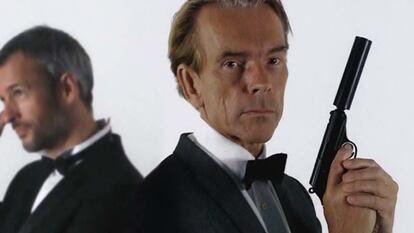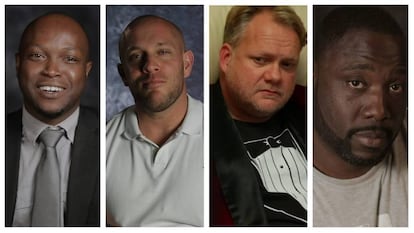‘The name’s Bond... James Bond.’ ‘Mine too!’
A documentary 10 years in the making follows the lives of people whose fates were forever sealed by a very famous name


When Ian Fleming wrote his first story about a womanizing, highly skilled British secret agent in 1952, he wanted the “most boring name” (his own words) he could find. He looked around and remembered a book he had used to identify the birds that flew over his mansion in Jamaica: Birds of the West Indies, by ornithologist James Bond. Without consulting the investigator, he gave his name to his agent 007 and forever changed his life; his, and that of his thousands of namesakes, to which the documentary The Other Fellow (2022) is dedicated. In it, director Matthew Bauer follows for 10 years some of those real James Bonds, men who live as best as they can under the shadow of a sexist, petulant and adventurous legacy.
The Other Fellow, available on the streaming platform Filmin, was filmed between the releases of Skyfall (2012) and No Time to Die (2021). According to official figures, there are 75,249 people in the United States with the surname Bond, and the most common first name among them is James (2.89%, or 2,242 James Bonds). Bauer contacted hundreds of them. What in the 1970s and 1980s was little more than an opportunity for an innocent quip, today, in the digital age, can sometimes be hell on Earth; even more so when a new film comes out. Then it becomes a form of torture.

Bauer selected some of the most striking stories that he came across. As the documentary goes on, one can see some of its protagonists gradually disappear, while new cases appear over time, like that of the black James Bond, inmate 280938 of the state of Indiana.
That Bond’s case is paradigmatic: at a police checkpoint, an African-American telling a police officer that his name was James Bond got him 60 days of jail time, regardless of the fact that it was, indeed, his name. Some time later he was accused of murder (he was later exonerated) in his city, South Bend, Indiana, a town of just over 100,000 inhabitants where, as unlikely as it may seem, another James Bond lived, this one white, whose business almost went belly up when the television news reported – without a picture of the defendant – that a James Bond from Indiana was incarcerated for murder.

Being a James Bond carries a stigma of alcoholism, womanizing and untrustworthiness. Just the opposite of theater director James Bond, from New York. On one hand, he claims that every time The New York Times reviews a premiere of his, it gets buried under the avalanche of news stories that use the tag that refers to the spy that Ian Fleming created. On the other hand, this Bond (one of nine registered in New York), a gay man who defines himself as disgusted by the secret agent phenomenon, takes advantage of the coincidence, making a profit by appearing in advertisements for online casinos from the American East Coast because he can legally say “My name is Bond, James Bond” without paying any royalties.
The Other Fellow also includes a former James Bond who changed his name to escape cyberbullying, an elite British soldier who ended up in the army after choosing a career path that befitted his name, a corrupt politician from Guyana, a lawyer from Philadelphia, an oil extracting family from Texas with four generations of James Bonds among its members... and two fascinating cases of people who are actually called James Bond because they wanted to.
The first one is Gunnar Schäfer, now officially James Bond. In his hometown of Nybro, in southern Sweden, Schäfer established the James Bond Museum, with all kinds of vehicles and paraphernalia from the 007 films. His exuberant collection stems from a childhood absence: his father, who managed to escape the Nazis during World War II, mysteriously disappeared in 1959, when Schäfer was two years old. Some time later, in 1964, that boy saw Goldfinger and found paternal echoes in the figure of the secret agent. Schäfer-Bond decided to become the alter ego of the spy and invests the money he makes from his tire business in 007 memorabilia; he only drinks martinis and Bollinger champagne.

The second case is that of a woman, a victim of marital violence who for years fled from her abuser with her son throughout the United Kingdom. The only way she managed to get away from him was after renaming her boy James Bond, thus becoming Mrs. Bond. No one would imagine such a move, using a famous name as a disguise. A smoke screen worthy of the secret agent.
Bauer also presents a fictional recreation of the story of the James Bond that started it all: the ornithologist, who one fine day discovered on television how he had unwittingly influenced Fleming. First he got furious, but over time they made peace and even became friends. That Bond did forgive Fleming.
Sign up for our weekly newsletter to get more English-language news coverage from EL PAÍS USA Edition
Tu suscripción se está usando en otro dispositivo
¿Quieres añadir otro usuario a tu suscripción?
Si continúas leyendo en este dispositivo, no se podrá leer en el otro.
FlechaTu suscripción se está usando en otro dispositivo y solo puedes acceder a EL PAÍS desde un dispositivo a la vez.
Si quieres compartir tu cuenta, cambia tu suscripción a la modalidad Premium, así podrás añadir otro usuario. Cada uno accederá con su propia cuenta de email, lo que os permitirá personalizar vuestra experiencia en EL PAÍS.
¿Tienes una suscripción de empresa? Accede aquí para contratar más cuentas.
En el caso de no saber quién está usando tu cuenta, te recomendamos cambiar tu contraseña aquí.
Si decides continuar compartiendo tu cuenta, este mensaje se mostrará en tu dispositivo y en el de la otra persona que está usando tu cuenta de forma indefinida, afectando a tu experiencia de lectura. Puedes consultar aquí los términos y condiciones de la suscripción digital.








































